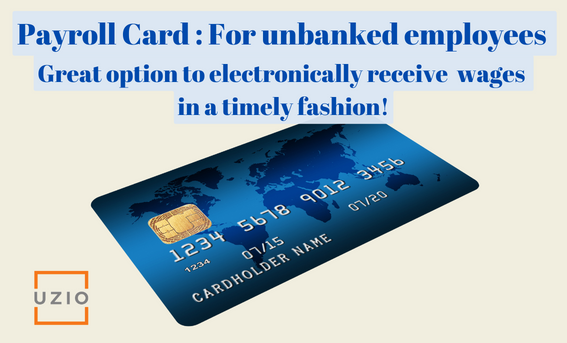Overview
Most employers pay their employees either through direct deposits in the employees bank accounts or through paper checks which are handed over to the employees or mailed to them. Lately employers have been moving away from paper checks because of the extra cost involved in printing and delivering checks to the employees. These options work great if the employees have a bank account. How do you pay employees who do not have a bank account?
In this article we will provide you with some options.
Unbanked Employees
According to a recent Forbes Article, there are close to 16 million unbanked consumers in the US. These are people who are living in households where no one has a checking or savings account in a bank. Moreover there are around 51 million US adults who are considered underbanked because they typically have poor credit ratings and are unlikely to generate meaningful income for the bank.
If you employ one of these people, how do you pay them? Let us explore different options available to you.
Pay Cards
One of the options you can use to pay unbanked employees is to use Pay Cards. Pay cards work like debit cards. Like direct deposit, payroll cards are a form of electronic payment. Each payday, the employee’s net wages are deposited directly into the pay card. The employee does not need to have a bank account to get and use the card. The Pay Cards are associated with major payment processors like Visa or Mastercard. These cards can be used at any establishment that accepts Visa or Mastercard. Plus the employee can use the card for online purchases as well as bill payments. The employee can also use the card at an ATM for cash withdrawals.
The Payroll vendors like UZIO offer Pay Cards as an added service to their employer clients (SMBs). Employees can choose to receive their pay via direct deposit, paper checks or Pay Cards. When Payroll is run, for employees who chose Pay Card as the option, the funds are instantly added to their Pay Card.
What Are The Benefits of Pay Cards
The benefits of a pay card are similar to those offered by other forms of electronic payment such as direct deposit.
Employers save on the cost of printing and depositing paper checks. The employees receive wages in a timely manner. Other benefits to employees include:
- Immediate access to wages on payday
- 24/7 access to funds through ATMs
- Ability to make in-store or online purchases
- Ability to pay bills on-line
What are Federal and State Regulations applicable to Pay Cards
Because some vendors charge high fees for use of pay cards, there are federal and sometimes state regulations that you should be aware of before implementing pay cards in your company.
At the federal level, the Consumer Financial Protection Bureau (CFPB) has the enforcing authority over pay cards. The CFPB prohibits employers from mandating that employees receive their wages using a pay card. The CFPB requires that the employers offer its employees a choice between a pay card and another payment method and the permissible alternative methods of wage payment are governed by state laws.
State Regulations
Below is a summary of the state laws governing the use of pay cards. You should consult the state statute for complete and specific information.
| State | Summary Regulation Governing Pay Card |
|---|---|
| Alabama | No express regulation. |
| Alaska | No express regulation. |
| Arizona | Pay cards can be offered for wage deposit if an employee has an option to receive direct deposit. Employees should be offered details of fees associated with the card and one free withdrawal for each wage deposit. |
| Arkansa | No express regulation. |
| California | No express regulation. For regulation purposes, paycards are treated similar to direct deposits. |
| Colorado | Employee should have another option to choose from and should be able to access entire wage amount free of charges each pay period |
| Connecticut | Employee should have another option to choose from and should be able to access entire wage amount free of charges each pay period |
| Delaware | Employers may issue a payroll debit card which provides the functional equivalent of cash or a check. It is the employers’ responsibility to effectuate a payroll debit card system which will allow full payment of wages on an employee's regular payday and without cost to the employee. |
| District of Columbia | No express regulation. |
| Florida | Florida Statutes identifies payroll debit cards as a permissible method of wage payment if certain conditions are met. |
| Georgia | Employees should be able to opt-out of pay cards at any time and be paid by check or direct deposit. |
| Hawaii | Requires employee's voluntary authorization provided certain conditions are met. Among other things, these conditions address written disclosures, alternative payment options, access to account information and cash wages without cost, fee prohibitions, and timely payment of wages to the payroll card account. |
| Idaho | No express regulation |
| Illinois | Employee should have another option to choose from and should be able to access entire wage amount free of charges each pay period |
| Indiana | No express regulation |
| Iowa | No express regulation |
| Kansas | Employers are authorized to use pay card when certain conditions are met. |
| Kentucky | Pay card authorized if the employee has access to entire wage free of any charge |
| Louisiana | No express regulation |
| Maine | Employee should have another option to choose from and should be able to access entire wage amount free of charges each pay period |
| Maryland | Pay card can be used if authorized by the employee and fees applicable to the pay card are disclosed to the employee |
| Massachusetts | No express regulation |
| Michigan | Permits the use of payroll debit cards if certain conditions are met. Among other things, these conditions relate to employee consent, access to funds in the account without cost, access to account balance information without cost, and advance notice of any changes in terms and conditions of the payroll debit card. In addition, the statute prohibits linking payroll debit cards to any form of credit and authorizes the payment of wages using direct deposit and payroll debit cards only if certain requirements are satisfied. |
| Minnesota | Permit the use of payroll cards if a variety of conditions are satisfied. Among other things, these conditions relate to ownership of the funds deposited into the payroll card account, written disclosures that must be made by employers, written consent by participating employees, and limitations on permissible fees. |
| Mississippi | No express regulation |
| Missouri | No express regulation |
| Montana | Paycards may be used if participation is voluntary and certain other conditions are met. |
| Nebraska | Paycards can be used if certain conditions are met. Requires access to full net wages at no cost |
| Nevada | Authorizes the use of electronic wage payment methods including payment on a debit card, if optional at the election of the employee and certain conditions are met. Among other things, the employee must be provided at least one free transaction each pay period, fees must be disclosed and consented to in writing by the employee, and the program may not include any restriction or requirement that a reasonable person would find to be an unreasonable burden or inconvenience. |
| New Hampshire | An employer may use payroll cards so long as employees are provided with at least one means of withdrawing the full balance from the card each pay period, at a financial institution or other location convenient to the place of employment, without any cost. Employee participation must be voluntary and may not be made a condition of hire or continued employment. Employers that offer payroll cards must comply with certain notice and disclosure requirements and must ensure that the payroll card account complies with the federal Electronic Funds Transfer Act and Federal Reserve Regulation E. |
| New Jersey | Authorizes employers to compensate their employees using payroll debit cards with the employees' voluntary written consent and provided certain other conditions are met. Among other things, these conditions relate to employee consent, access to wages without cost or difficulty, required disclosures, and the ability to change payment methods. |
| New York | NY treats pay cards as another kind of direct deposit so all the regulations of direct deposit are applicable to pay cards. Among other things, an employee must consent in writing, it can not be a condition of employment and an employee should have full access to his/her wages without any fee. |
| North Carolina | No express regulation. |
| North Dakota | Permits the payment of wages using stored value cards issued by a federally insured bank or credit union. Among other things, the funds underlying the card must be an insured deposit and employee participation must be voluntary. |
| Ohio | No express regulation. |
| Oklahoma | Authorizes the payment of wages using "electronic means." In this opinion letter, the state Attorney General opined that the section 165.2 must be interpreted in accordance with the federal Electronic Funds Transfer Act (EFTA) and Regulation E. Among other things, the letter addresses the circumstances under which employers may compel the payment of wages using electronic means and the electronic delivery of deduction statements. |
| Oregon | Authorizes use of pay cards and requires an agreement between the employer and the employee that meets specified conditions and addresses access to wages without cost. |
| Pennsylvania | Provides that where a law or regulation requires that a payment be made in lawful money or by check, the payment may be made by credit to an account at a financial institution, including a payroll card account, if the recipient of the payment has authorized the payment method in writing or electronically. Certain conditions must be satisfied when payroll cards are used. Among other things, these conditions relate to disclosures, cash access, fees and change in payment methods. |
| Rhode Island | Authorizes the payment of wages by credit to a payroll card account upon written or electronic request of the employee. Among other things, the statute defines "payroll card account" and requires that employees be able to make at least one withdrawal from the payroll card account each pay period without charge. |
| South Carolina | No express regulation. |
| South Dakota | No express regulation. |
| Tennessee | Authorizes the payment of wages using a prepaid debit card provided certain conditions are met. Among other things, these conditions require that employees also be given the option of being paid by direct deposit, receive written disclosure of applicable fees, and be able to make at least one withdrawal or transfer each pay period without cost for any amount contained on the card. |
| Texas | No express regulations. Wages can be paid using paycards if certain conditions are met. Among other things, the payment method must be approved by the employee in writing. |
| Utah | Authorizes the use of pay cards provided certain conditions are met. Among other things, the Rule addresses the ability to withdraw full wages on payday without cost and the conditions under which the required statement of deductions may be provided electronically. |
| Vermont | Authorize the payment of wages by credit to a payroll card account with the written consent of the employee and provided a variety of conditions are met. Among other things, these conditions relate to written disclosures, access to account information and cash wages without cost, prohibited fees, linkage to credit, and post-employment responsibilities. |
| Virginia | Permits the payment of wages using a prepaid debit card provided certain conditions are met. Among other things, these conditions relate to employee consent and required disclosures. The statute also identifies the circumstances under which paycards may be the default method of wage payment for employees hired after January 1, 2010 who do not designate an account for direct deposit. |
| Washington | No express regulations. Wages can be paid using paycards if certain conditions are met. Among other things, certain requirements must be met if there are fees for using the card. |
| West Virginia | Permits payment by deposit or electronic transfer of immediately available funds into an employee's payroll card account in a federally insured depository institution. The employee and employer must agree in writing to payment using a payroll card. |
| Wisconsin | No express regulation. |
| Wyoming | No express regulation. |
Conclusion
For unbanked employees, a pay card is a great option to electronically receive their wages in a timely fashion. It is a safe and cost effective way to receive the wages if the employee can not avail of the direct deposit or paper check option. For employers, Pay Cards save cost and time as the wages are electronically deposited in the employees pay card without the need of printing and mailing paper checks. The employers have the legal obligation to ensure they are in compliance with federal and state regulations when rolling out Pay cards. The main regulation they need to follow is that it should be a voluntary process for employees to sign up, employees should have other options to receive wages and they should be able to withdraw their wages without incurring any cost.
Get in touch with us for an expert-led demo to know more about UZIO payroll services.















